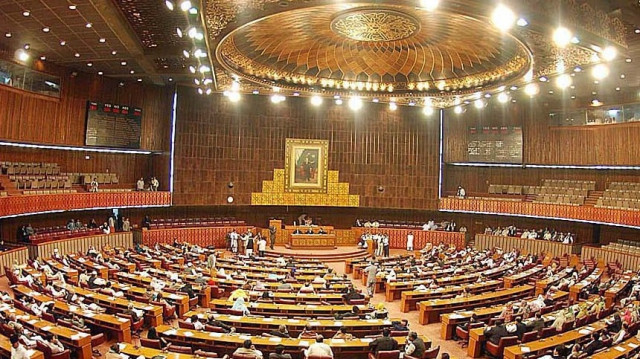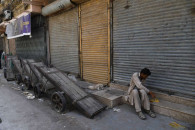Comment: Politically correct
Raising the right questions about reserved seats and direct elections.

Raising the right questions about reserved seats and direct elections. PHOTO: APP/FILE
Naila was among 32,222 women directly elected as councillors in the 2000-01 local government elections. This first-time electoral contestant surprised many by securing the highest number of votes in a union council of Khyber-Pakhtunkhwa’s District Nowshera. Her vote tally was about the same as the combined vote count of the union council nazim and naib nazim who contested on a joint ticket.
Before entering the gruelling arena of electoral politics, 30-year old Naila managed her home, and headed the parent-teacher association that monitored the local village school. Naila decided to contest the local government elections after political space was created for women, workers, peasants and non-Muslim citizens through reservation of seats included in the Local Government Ordinance 2001.

In the 2001 model the union council consisting of 21 members was the lowest level of local government, and was the only tier in which elections to all seats were directly contested. It included 12 general seats of which 4 were reserved for women; 6 seats for workers/peasants of which 2 were reserved for women; and one seat for non-Muslim citizens. The union council nazim and naib nazim had one seat each, which they contested on a joint ticket. 33 per cent seats for women were also reserved at the tehsil and district levels, but these were indirectly elected.
Reservation of seats for the socially and politically excluded was a bold policy measure. It helped level the playing field. It reduced social disparity. It challenged elite monopoly on power. It gave women, workers, peasants and non-Muslim citizens a voice, and control over decisions on education, health, roads, employment, justice, and conflict resolution. It recognized them as equal citizens.
Political opportunity created by reserved seats is important in itself. But direct elections on them provide greater legitimacy and a more genuine public mandate. Like Naila, thousands of women, workers, peasants and non-Muslims seized the opportunity offered for public representation in 2001. Winners received a mandate shaped by public votes. Losers also benefitted from the experience of politicking and public engagement.

Some skeptics had opposed the number of reserved seats directly contested. It’s unrealistic, they claimed, to expect women, workers, peasants and non-Muslims to campaign for votes. They feared many seats would remain uncontested. Electoral results proved their doubts were baseless. In only a few isolated areas, seats remained vacant.
There was another reason for the low number of vacant seats. Policy-makers in 2001 had craftily dangled an irresistible carrot to fill reserved seats. They made all councillors, including those elected on reserved seats, the electorate for elections to higher levels of authority. Those vying for lucrative posts such as District Nazim needed every vote. Vacant seats meant reduced votes, and a possible electoral defeat.
Political space created in 2001 was reclaimed by rushed and ill-conceived amendments made just before the 2005 local government elections. The size of the union council was reduced from 21 to 13 members. Despite percentages of reserved seats remaining unchanged, the absolute number of representatives elected on reserved seats was reduced in direct proportion to the slashed union council seats.
With the Supreme Court demanding prompt local government elections, provincial governments are working overtime to finalize their local government plans. Statements from Punjab claim reservation of 33 per cent seats for women. It is not yet clear if there will be political space for other socially excluded groups. Khyber-Pakhtunkhwa is also reportedly considering reservation of seats for women, and also for the youth. But the numbers of reserved seats is yet to be made public. An equally important question is: how will the reserved seats be contested?
A few months ago, Pakistan Tehreek-e-Insaf’s Imran Khan was severely criticized for his unfortunate comments against reserved seats for women. Subsequent clarifications indicate he was lamenting the method of proportional representation used for filling reserved seats for women in the provincial and national assemblies. The problems of nepotism and merit that he highlighted would be addressed if there is a direct contest for reserved seats. With PTI now in power in Khyber-Pakhtunkhwa, it has the opportunity to get it right as it shapes local government in the province and make political space for public representatives such as Naila.
The writer is a member of the Advisory Committee on Local Government (2000-01) .
Published in The Express Tribune, July 23rd, 2013.



















COMMENTS
Comments are moderated and generally will be posted if they are on-topic and not abusive.
For more information, please see our Comments FAQ